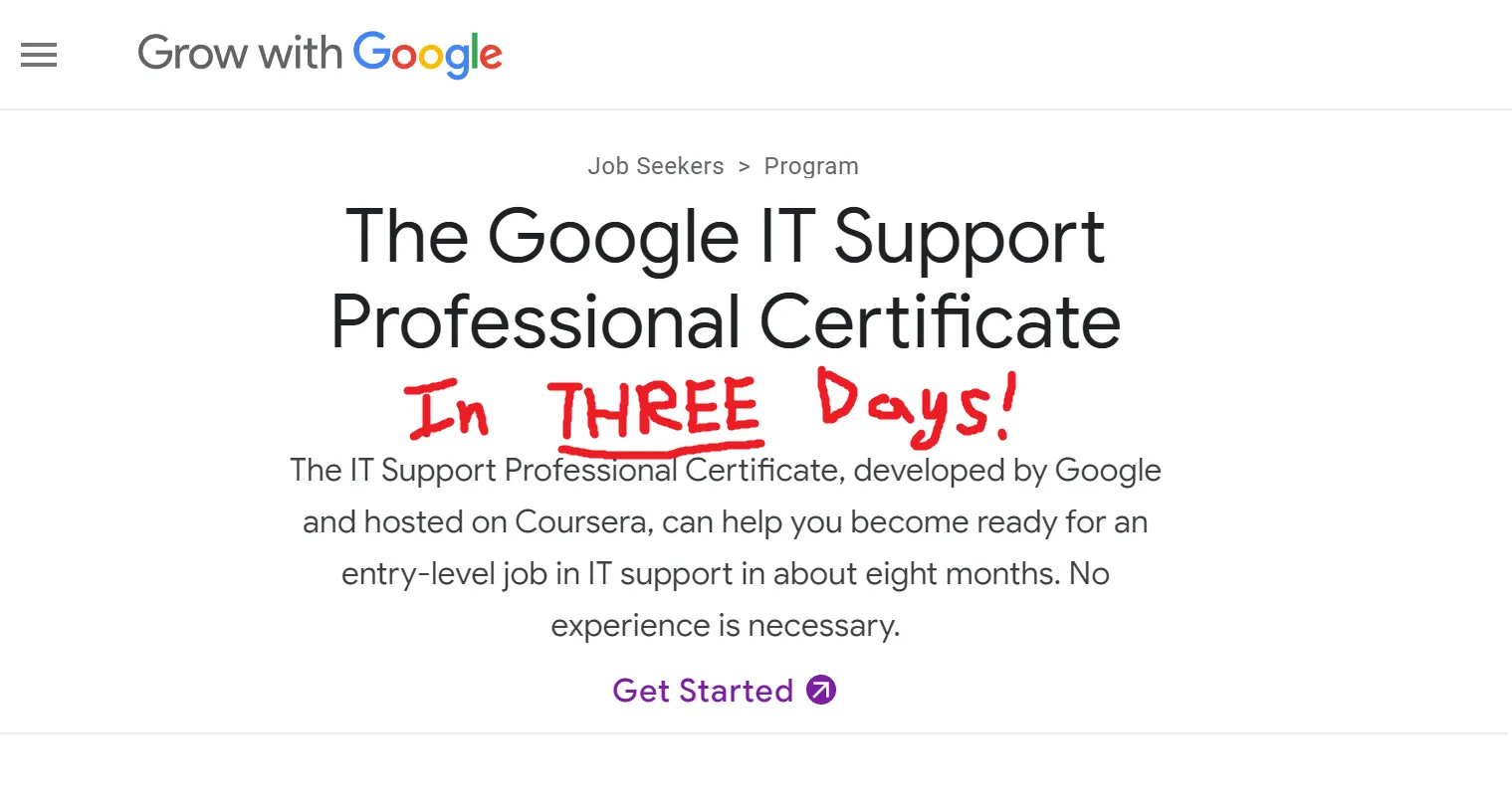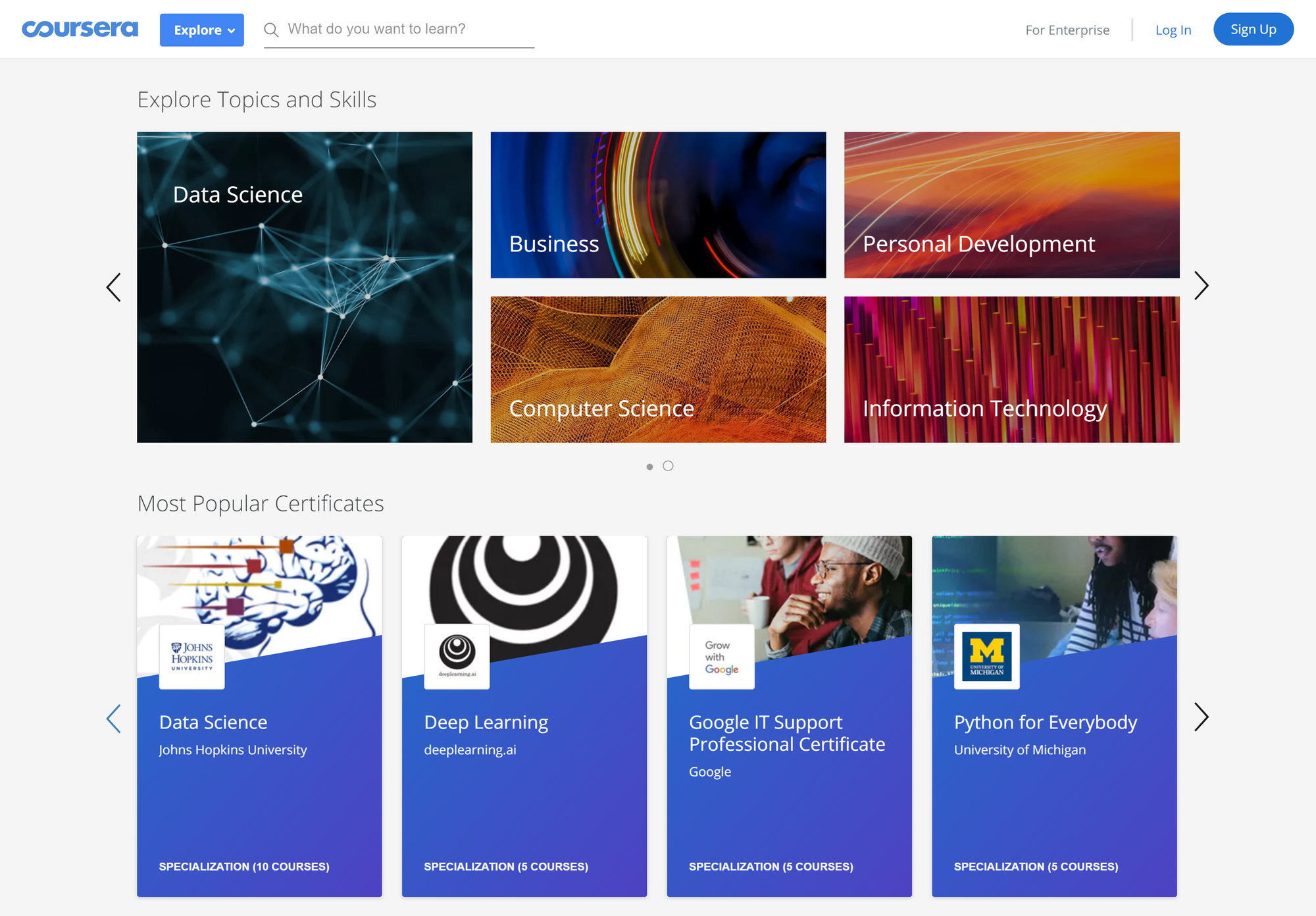How I got the Google IT Support Professional Certificate in a little over 3 days
It all started with me doing some casual search about technology certifications last week. There was just a few pressing problems ...

It all started with me doing some casual search about technology certifications last week.
I wanted to learn more about CompTIA , Microsoft Certifications, the venerable Cisco Certifications and other good certifications for future employment.
There was just a few pressing problems
- They cost money
- I have no confidence of passing them on the first try.
One search led to another (thanks Google) and suddenly I was looking at a recommended list of Massive Open Online Courses (MOOCs), those related to Computer Science in particular.
Sure sure, I have audited and completed a few MOOCs related to Mathematics, one or two obscure self improvement courses and a few others in the past, but are there any MOOCs that come with certifications I might actually put on my resume or LinkedIn profile?
I was browsing the Coursera Course Catalog and saw this

I dug further and found the official website for this Google IT Support Professional Certificate over at https://grow.google/programs/it-support/
Google IT Support Professional Certificate
Quoting the page directly, it is developed 100% by Google and hosted on Coursera and "can help you become ready for an entry-level job in IT support in about eight months. No experience is necessary. "
This is getting more and more intriguing, you see, the Google IT Support Professional Certificate is classified as a specialization over at Coursera, it consists of five different courses.
- Technical Support Fundamentals
- The Bits and Bytes of Computer Networking
- Operating Systems and You: Becoming a Power User
- System Administration and IT Infrastructure Services
- IT Security: Defense against the digital dark arts
There used to be another course IT Automation making the total six but it was removed recently, apart from the System Admin and IT Security, I was actually looking forward to automation topics, oh well.
Now all the courses are free to audit, but there will not be any assignments and of course you will not receive a certificate for completion. To get a certificate, you can either pay a subscription of 49 dollars a month , apply for financial aid from Coursera, or you can take the route I took
A free trial that lasts for 7 days.
Challenge: Complete a supposedly 8 months specialisation in 7 days
Challenge Accepted!
I apologize if you saw that clickbait title and decided to read about the tips and tricks of how I did it in a meagre 3 days.
If you are an absolute beginner, yes, it WILL take you at least 3 or 4 months if you go through all the videos, supplemental readings, your own further research to understand everything that is taught, and knowing how to apply them going along at a casual pace.
If you have some prior knowledge in lets say networking, most of the networking course content will be a good refresher of your existing knowledge, the same goes to the other courses like operating systems power users, IT security etc.
What I did
I kind of started the free trial four days before the next session started, which meant that the final graded assignments for all the courses were still locked, all except for one: Operating Systems and You: Becoming a Power User
Honestly, if you are able to open a browser to access the course to upload assignments for the very first course in the series, you are already well equipped to handle more than half of this particular course, at least the parts using the Graphical UI interfaces.
There are some content taught like Disk Partitioning and user access controls which will be unfamiliar to beginners.
The technical labs uses this Qwiklabs for you to try out on actual machines through Google Cloud Platform so that's pretty cool.
I am no stranger to Windows Powershell and Bash on Linux so for most of the labs, especially the Windows labs, it took way more time for one Lab to finish setting up compared to the time taken for me to complete every single lab in the course. (Linux Labs were almost instantaneous though).
It took me around 2 to 3 hours and the first course was done and dusted.
The other courses usually have two or three required quizzes and one of those locked graded assignments. I spent a day finishing those quizzes, and watching every single video for the last two courses, System Administration & IT Infrastructure Services
as well as IT Security: Defense against the digital dark arts, there were some pretty good content in the courses which served as a refresher for me in anticipation of the locked assignments to be released two days later.
I did glance through the content of the other courses, the content in this specialization is actually pretty good, both in terms of depth as well as the breadth of the content. Oh right (I actually factored in sleep time and procrastination time into the day too), actual productive time is more like a little under 8 hours.
The horror of peer grading
I had nothing else to do after that one day while waiting for the locked assignments to be available once the session actually started, so I waited.
Four days later, the floodgates were opened. I shall not reveal any spoilers about the graded assignments here.
A quick note that may make some of you happy, these graded assignments are peer reviewed.
YES. PEER.. REVIEWED..
You may think that this is a good thing, I beg to differ.
With peer reviews come this interesting point to note, your peers are like you, and they probably paid for a subscription to get the specialization certificate.
There are peers who will not even read your submissions and will gladly give you the maximum grade possible.
Remember that the onus is on you to put in the actual effort to submit quality assignments.
I mean you could theoretically submit written assignments with no effort at all and highly possibly get a 100% grade. There isn't a vested interest to grade someone truthfully by following the rubrics given, unless you are fortunate or unfortunate enough to be peer reviewed by someone like me, I read every assignment word for word and give detailed comments on every review, even if something required by the rubrics like a keyword or two cannot be found, I will give you the benefit of the doubt if I find that you have a good grasp of what you actually wrote, or have written something along the lines of the rubric.
Cue the revenge
The very fact that a reviewer has the power to randomly give grades resulted in some pretty amusing results. For one of the final assignments, someone decided to play a game of random potluck. You see for each rubric given for the assignment, there are different points to be awarded.
For example :
- 4 points : List 3 examples with the following 3 keywords with detailed reasoning
- 3 points : List 2-3 examples with the following 2-3 keywords with some reasoning
- 2 points : List 2 examples with the following 2-3 keywords with no reasoning
- 1 points : List 1 examples with the following 1-2 keywords with no reasoning
This peer reviewer decided to give me 0 points despite hitting the 4 points guidelines in one section and full points for another (in which I actually forgot to address), the telltale sign of someone who does not even read your assignment.
He also ended with the comments "Fantastic work" after giving me a 40% review.
I resubmitted the exact same assignment and got the required grade of >80% from an honest reviewer later on, with a full page he had written on how to do better.
Final thoughts
Content wise, I am very impressed with the amount of thought and effort in how the courses were structured and the assignments were very interesting and pretty close to real world requirements.
The only parts to nitpick about would be the peer review system, there is no vested interest for fellow students to actually give proper reviews. This kind of defeats the purpose of the word "Professional Certificate", but I guess if it helps people to get their first entry level job, I can't really argue against that.
I strongly recommend beginners who want to get started with technology or even seasoned IT support/System Admins to take the Google IT Support Professional Specialization, existing IT engineers will not need the entry level certificate it provides but it serves as an excellent source for refreshers, who knows you might learn something that you have lost touch with over the years.
It is also nice to note that at the end of completing all the 5 courses, there is a survey which you will want to fill , especially for beginners as you can choose to submit your resume which will be provided to companies like Google, Infosys, TekSystems and many other companies to help your land your first entry level job.
It probably should not have been called a "Professional Certificate", but it is still a pretty darn good MOOC.
All in all, counting the waiting time to get peer reviewed and to get the final specialization certificate, I did it in a little less than three days or seven days if u want to count from starting the trial to actually getting the final specialization certificate.
What a great way to utilize the 7 day free trial, will you take the challenge too?
Thank your for reading!
